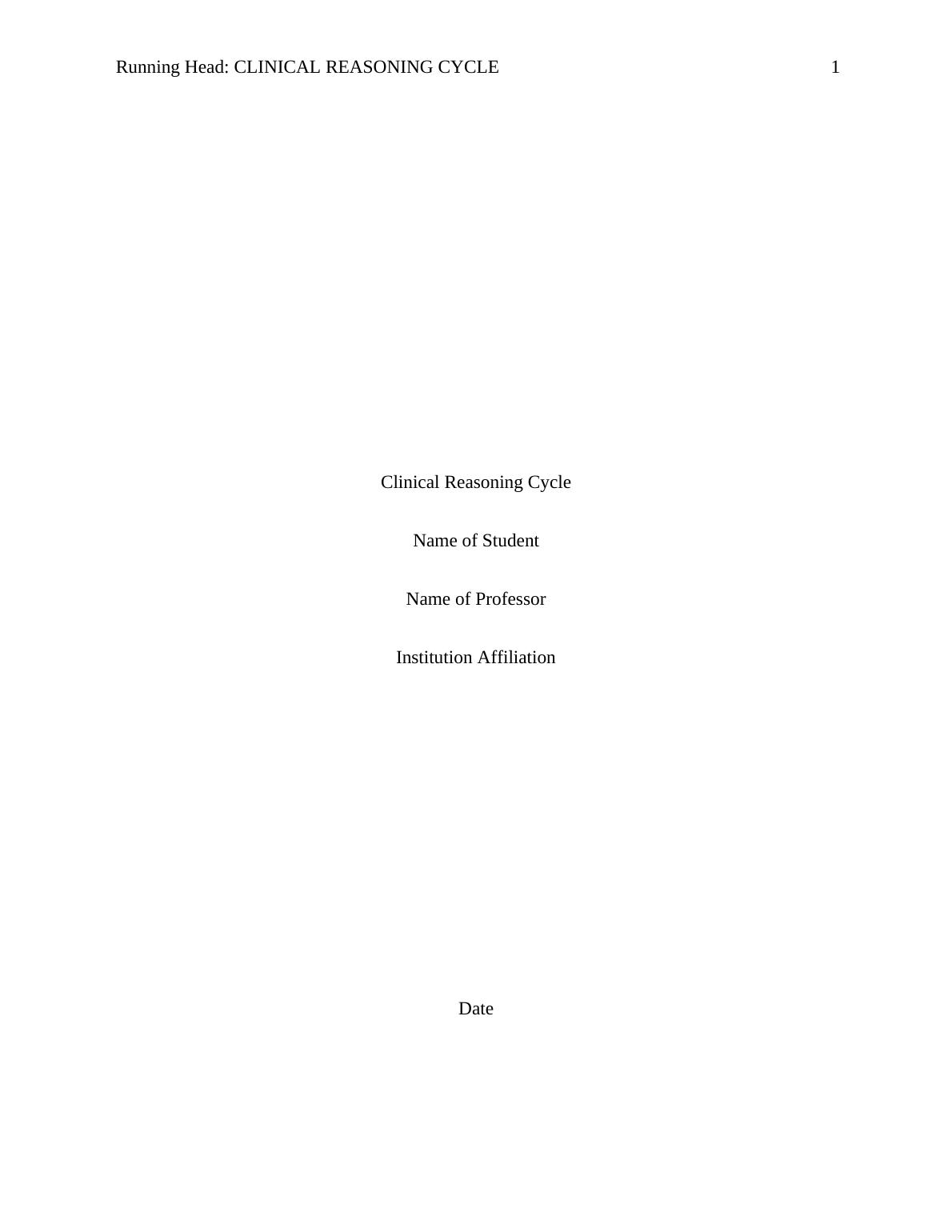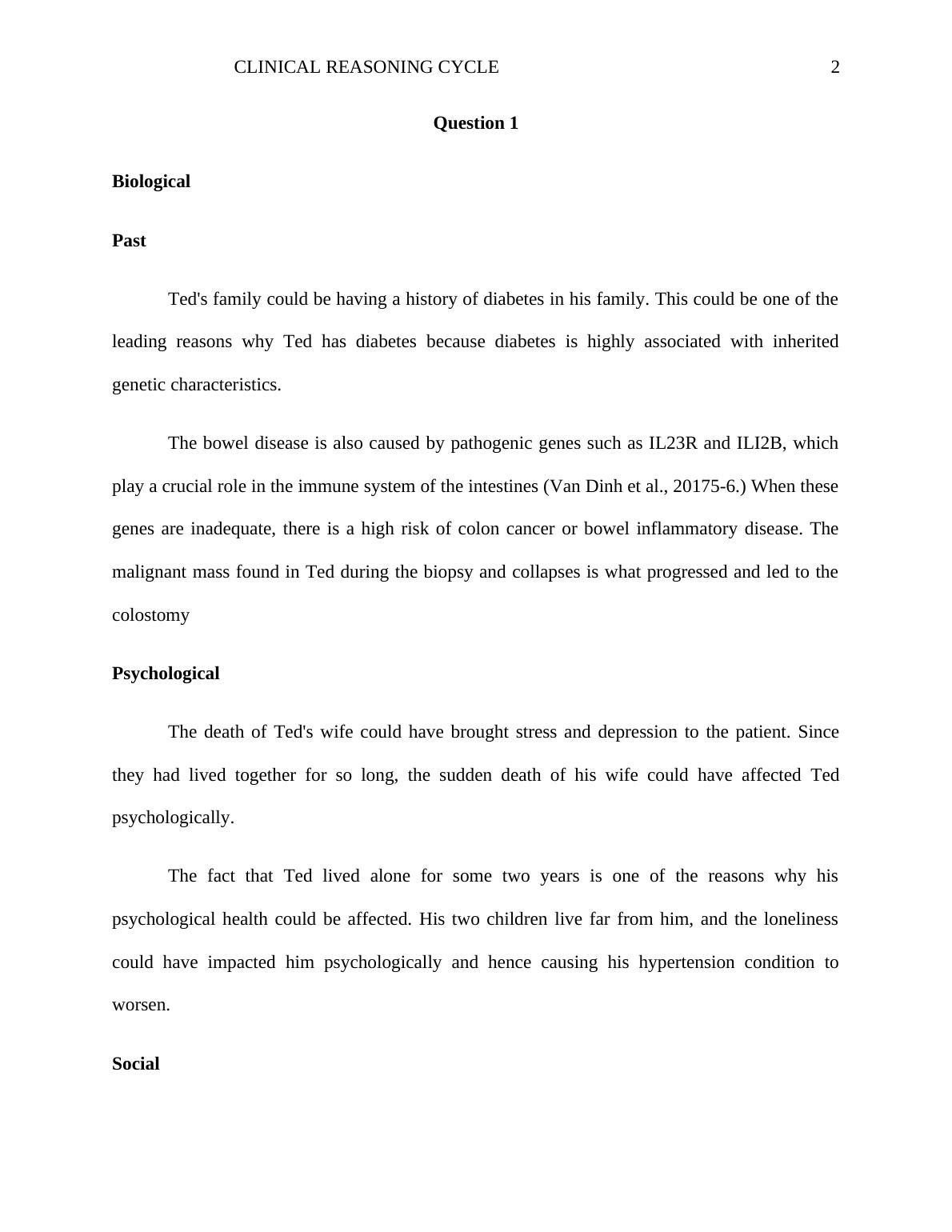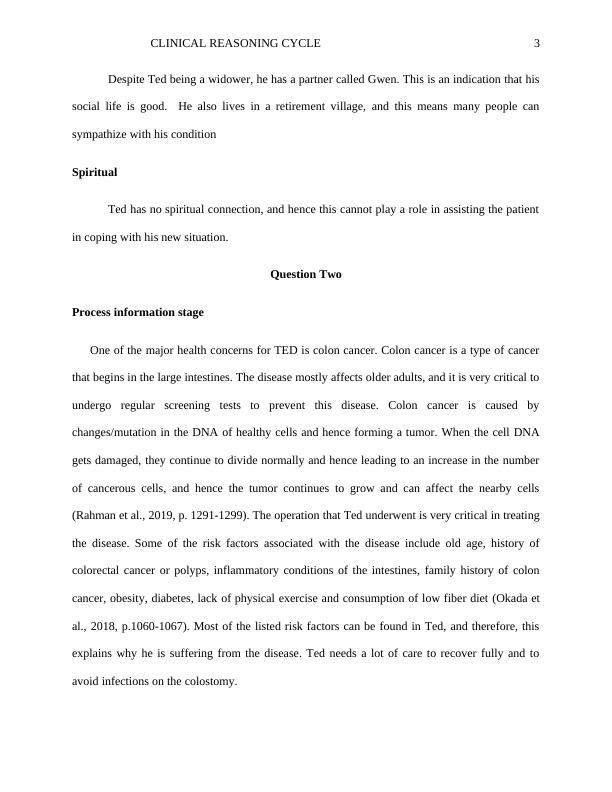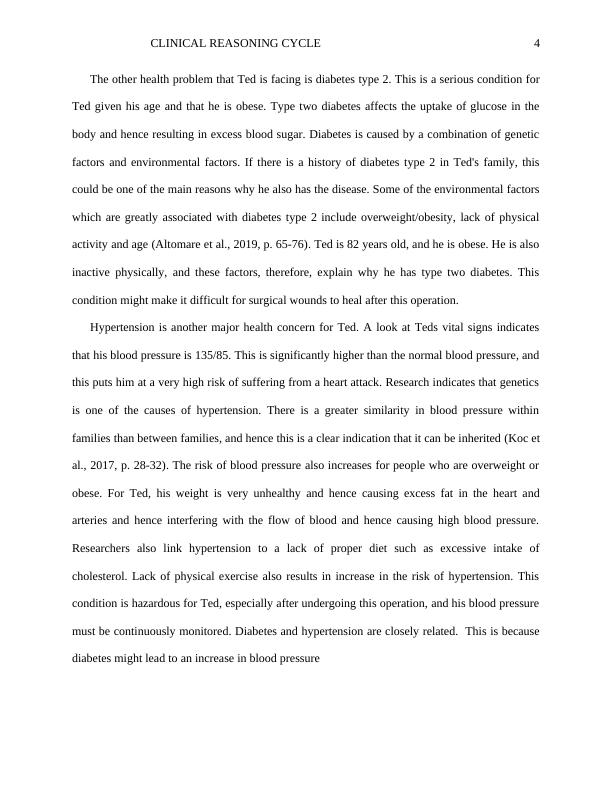Clinical Reasoning Cycle docx.
Assessment task for NRSG258 course, a written assignment on a surgical case study, due on Monday 20th April 23:59.
11 Pages2924 Words32 Views
Added on 2022-07-28
Clinical Reasoning Cycle docx.
Assessment task for NRSG258 course, a written assignment on a surgical case study, due on Monday 20th April 23:59.
Added on 2022-07-28
ShareRelated Documents
Running Head: CLINICAL REASONING CYCLE 1
Clinical Reasoning Cycle
Name of Student
Name of Professor
Institution Affiliation
Date
Clinical Reasoning Cycle
Name of Student
Name of Professor
Institution Affiliation
Date

CLINICAL REASONING CYCLE 2
Question 1
Biological
Past
Ted's family could be having a history of diabetes in his family. This could be one of the
leading reasons why Ted has diabetes because diabetes is highly associated with inherited
genetic characteristics.
The bowel disease is also caused by pathogenic genes such as IL23R and ILI2B, which
play a crucial role in the immune system of the intestines (Van Dinh et al., 20175-6.) When these
genes are inadequate, there is a high risk of colon cancer or bowel inflammatory disease. The
malignant mass found in Ted during the biopsy and collapses is what progressed and led to the
colostomy
Psychological
The death of Ted's wife could have brought stress and depression to the patient. Since
they had lived together for so long, the sudden death of his wife could have affected Ted
psychologically.
The fact that Ted lived alone for some two years is one of the reasons why his
psychological health could be affected. His two children live far from him, and the loneliness
could have impacted him psychologically and hence causing his hypertension condition to
worsen.
Social
Question 1
Biological
Past
Ted's family could be having a history of diabetes in his family. This could be one of the
leading reasons why Ted has diabetes because diabetes is highly associated with inherited
genetic characteristics.
The bowel disease is also caused by pathogenic genes such as IL23R and ILI2B, which
play a crucial role in the immune system of the intestines (Van Dinh et al., 20175-6.) When these
genes are inadequate, there is a high risk of colon cancer or bowel inflammatory disease. The
malignant mass found in Ted during the biopsy and collapses is what progressed and led to the
colostomy
Psychological
The death of Ted's wife could have brought stress and depression to the patient. Since
they had lived together for so long, the sudden death of his wife could have affected Ted
psychologically.
The fact that Ted lived alone for some two years is one of the reasons why his
psychological health could be affected. His two children live far from him, and the loneliness
could have impacted him psychologically and hence causing his hypertension condition to
worsen.
Social

CLINICAL REASONING CYCLE 3
Despite Ted being a widower, he has a partner called Gwen. This is an indication that his
social life is good. He also lives in a retirement village, and this means many people can
sympathize with his condition
Spiritual
Ted has no spiritual connection, and hence this cannot play a role in assisting the patient
in coping with his new situation.
Question Two
Process information stage
One of the major health concerns for TED is colon cancer. Colon cancer is a type of cancer
that begins in the large intestines. The disease mostly affects older adults, and it is very critical to
undergo regular screening tests to prevent this disease. Colon cancer is caused by
changes/mutation in the DNA of healthy cells and hence forming a tumor. When the cell DNA
gets damaged, they continue to divide normally and hence leading to an increase in the number
of cancerous cells, and hence the tumor continues to grow and can affect the nearby cells
(Rahman et al., 2019, p. 1291-1299). The operation that Ted underwent is very critical in treating
the disease. Some of the risk factors associated with the disease include old age, history of
colorectal cancer or polyps, inflammatory conditions of the intestines, family history of colon
cancer, obesity, diabetes, lack of physical exercise and consumption of low fiber diet (Okada et
al., 2018, p.1060-1067). Most of the listed risk factors can be found in Ted, and therefore, this
explains why he is suffering from the disease. Ted needs a lot of care to recover fully and to
avoid infections on the colostomy.
Despite Ted being a widower, he has a partner called Gwen. This is an indication that his
social life is good. He also lives in a retirement village, and this means many people can
sympathize with his condition
Spiritual
Ted has no spiritual connection, and hence this cannot play a role in assisting the patient
in coping with his new situation.
Question Two
Process information stage
One of the major health concerns for TED is colon cancer. Colon cancer is a type of cancer
that begins in the large intestines. The disease mostly affects older adults, and it is very critical to
undergo regular screening tests to prevent this disease. Colon cancer is caused by
changes/mutation in the DNA of healthy cells and hence forming a tumor. When the cell DNA
gets damaged, they continue to divide normally and hence leading to an increase in the number
of cancerous cells, and hence the tumor continues to grow and can affect the nearby cells
(Rahman et al., 2019, p. 1291-1299). The operation that Ted underwent is very critical in treating
the disease. Some of the risk factors associated with the disease include old age, history of
colorectal cancer or polyps, inflammatory conditions of the intestines, family history of colon
cancer, obesity, diabetes, lack of physical exercise and consumption of low fiber diet (Okada et
al., 2018, p.1060-1067). Most of the listed risk factors can be found in Ted, and therefore, this
explains why he is suffering from the disease. Ted needs a lot of care to recover fully and to
avoid infections on the colostomy.

CLINICAL REASONING CYCLE 4
The other health problem that Ted is facing is diabetes type 2. This is a serious condition for
Ted given his age and that he is obese. Type two diabetes affects the uptake of glucose in the
body and hence resulting in excess blood sugar. Diabetes is caused by a combination of genetic
factors and environmental factors. If there is a history of diabetes type 2 in Ted's family, this
could be one of the main reasons why he also has the disease. Some of the environmental factors
which are greatly associated with diabetes type 2 include overweight/obesity, lack of physical
activity and age (Altomare et al., 2019, p. 65-76). Ted is 82 years old, and he is obese. He is also
inactive physically, and these factors, therefore, explain why he has type two diabetes. This
condition might make it difficult for surgical wounds to heal after this operation.
Hypertension is another major health concern for Ted. A look at Teds vital signs indicates
that his blood pressure is 135/85. This is significantly higher than the normal blood pressure, and
this puts him at a very high risk of suffering from a heart attack. Research indicates that genetics
is one of the causes of hypertension. There is a greater similarity in blood pressure within
families than between families, and hence this is a clear indication that it can be inherited (Koc et
al., 2017, p. 28-32). The risk of blood pressure also increases for people who are overweight or
obese. For Ted, his weight is very unhealthy and hence causing excess fat in the heart and
arteries and hence interfering with the flow of blood and hence causing high blood pressure.
Researchers also link hypertension to a lack of proper diet such as excessive intake of
cholesterol. Lack of physical exercise also results in increase in the risk of hypertension. This
condition is hazardous for Ted, especially after undergoing this operation, and his blood pressure
must be continuously monitored. Diabetes and hypertension are closely related. This is because
diabetes might lead to an increase in blood pressure
The other health problem that Ted is facing is diabetes type 2. This is a serious condition for
Ted given his age and that he is obese. Type two diabetes affects the uptake of glucose in the
body and hence resulting in excess blood sugar. Diabetes is caused by a combination of genetic
factors and environmental factors. If there is a history of diabetes type 2 in Ted's family, this
could be one of the main reasons why he also has the disease. Some of the environmental factors
which are greatly associated with diabetes type 2 include overweight/obesity, lack of physical
activity and age (Altomare et al., 2019, p. 65-76). Ted is 82 years old, and he is obese. He is also
inactive physically, and these factors, therefore, explain why he has type two diabetes. This
condition might make it difficult for surgical wounds to heal after this operation.
Hypertension is another major health concern for Ted. A look at Teds vital signs indicates
that his blood pressure is 135/85. This is significantly higher than the normal blood pressure, and
this puts him at a very high risk of suffering from a heart attack. Research indicates that genetics
is one of the causes of hypertension. There is a greater similarity in blood pressure within
families than between families, and hence this is a clear indication that it can be inherited (Koc et
al., 2017, p. 28-32). The risk of blood pressure also increases for people who are overweight or
obese. For Ted, his weight is very unhealthy and hence causing excess fat in the heart and
arteries and hence interfering with the flow of blood and hence causing high blood pressure.
Researchers also link hypertension to a lack of proper diet such as excessive intake of
cholesterol. Lack of physical exercise also results in increase in the risk of hypertension. This
condition is hazardous for Ted, especially after undergoing this operation, and his blood pressure
must be continuously monitored. Diabetes and hypertension are closely related. This is because
diabetes might lead to an increase in blood pressure

End of preview
Want to access all the pages? Upload your documents or become a member.
Related Documents
Critical Analysis of Case Study 2022lg...
|11
|3115
|16
Critical Analysis Case Study 2022lg...
|11
|2912
|31
Colorectal Cancer Case Studylg...
|6
|1814
|51
The body temperature was higher with systolic hypertensionlg...
|12
|3251
|15
Case Study Of Health Problemslg...
|11
|3056
|52
Nursing Care of the Surgical Patient | Assignmentlg...
|9
|2580
|20
